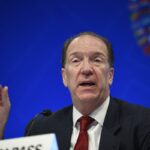The world is unlikely to achieve its objective of eradicating extreme poverty by 2030 absent history-defying rates of economic growth over the remainder of this decade, the latest World Bank Poverty and Shared Prosperity Report revealed.
According to the international financial institution, COVID-19 caused the worst setback to global efforts to reduce poverty since 1990, and with the latest Ukrainian crisis and geopolitical tensions among nations pose a threat to make matters worse.
The World Bank report provides the first comprehensive look at the global landscape of poverty in the aftermath of the extraordinary series of shocks to the global economy over the past few years.
The report estimates that the pandemic pushed about 70 million people into extreme poverty in 2020, the largest one-year increase since global poverty monitoring began in 1990. As a result, an estimated 719 million people subsisted on less than $2.15 a day by the end of 2020.

“There is a clear crisis in development — poverty is going up and median incomes are going down,” World Bank Group president David Malpass said in a statement.
“Progress in reducing extreme poverty has essentially halted in tandem with subdued global economic growth,” Malpass adds.
“Of concern to our mission is the rise in extreme poverty and decline of shared prosperity brought by inflation, currency depreciations, and broader overlapping crises facing development. It means a grim outlook for billions of people globally. Adjustments of macroeconomic policies are needed to improve the allocation of global capital, foster currency stability, reduce inflation, and restart growth in median income. The alternative is the status quo—slowing global growth, higher interest rates, greater risk aversion, and fragility in many developing countries.”
The report also indicates that 2020 marked a historic turning point—when the era of global income convergence yielded to divergence.
Significant Blow to World’s Poorest People
The poorest people bore the steepest costs of the pandemic: income losses averaged 4% for the poorest 40%, double the losses of the wealthiest 20% of the income distribution. Global inequality rose, as a result, for the first time in decades.
According to the World Bank, strong fiscal policy measures made a notable difference in reducing COVID-19’s impact on poverty. In fact, the average poverty rate in developing economies would have been 2.4 percentage points higher without a fiscal response.
However, government spending proved far more beneficial to poverty reduction in the wealthiest countries, which generally managed to fully offset COVID-19’s impact on poverty through fiscal policy and other emergency support measures. Developing economies had fewer resources and therefore spent less and achieved less: upper-middle-income economies offset just 50% of the poverty impact, and low- and lower-middle-income economies offset barely a quarter of the impact.
“Over the next decade, investing in better health and education will be crucial for developing economies, given the severe learning losses and health-related setbacks they suffered during the pandemic,” Indermit Gill, World Bank’s Chief Economist and Senior Vice President for Development Economics said.
“In a time of record debt and depleted fiscal resources, this will not be easy. Governments will need to concentrate their resources on building human capital and maximizing growth.”
The new report is the first to provide current and historical data on the new global extreme-poverty line, which has been adjusted upward to $2.15 a day to reflect the latest 2017 purchasing-power-parity data. Extreme poverty fell dramatically across the world from 1990 through 2019, the latest year for which official data are available. But progress slowed after 2014, and policymakers now confront a tougher environment: Extreme poverty is concentrated in parts of the world where it will be hardest to eradicate—in Sub-Saharan Africa, in conflict-affected areas, and in rural areas.
Sub-Saharan Africa now accounts for 60% of all people in extreme poverty—389 million, more than any other region. The region’s poverty rate is about 35%, the world’s highest.
To achieve the 2030 poverty goal, the World Bank suggests each country in the region would need to achieve per-capita GDP growth of 9% per year for the remainder of this decade. That’s an exceptionally high hurdle for countries whose per-capita GDP growth averaged 1.2 percent in the decade before COVID-19.
World Bank Fiscal Policy Actions
National policy reforms can help restart progress in reducing poverty, the World Bank report finds. Stepped-up global cooperation will also be necessary to finally put an end to extreme poverty. In terms of fiscal policy, the World Bank suggests that governments should act promptly on three fronts:
- Avoid broad subsidies, and increase targeted cash transfers: Half of all spending on energy subsidies in low- and middle-income economies goes to the richest 20 percent of the population who consume more energy. Cash transfers are a far more effective mechanism for supporting poor and vulnerable groups.
- Focus on long-term growth: High-return investments in education, research and development, and infrastructure projects need to be made today. In a time of scarce resources, more efficient spending and improved preparation for the next crisis will be key.
- Mobilize domestic revenues without hurting the poor. Property taxes and carbon taxes can help raise revenue without hurting the most impoverished. So can broadening the base of personal and corporate income taxes. If sales and excise taxes do need to be raised, governments should minimize economic distortions and negative distributional impacts by simultaneously using targeted cash transfers to offset their effects on the most vulnerable households.
Read More Stories: Elon Musk Changes Mind, Wants to Buy Twitter Again
